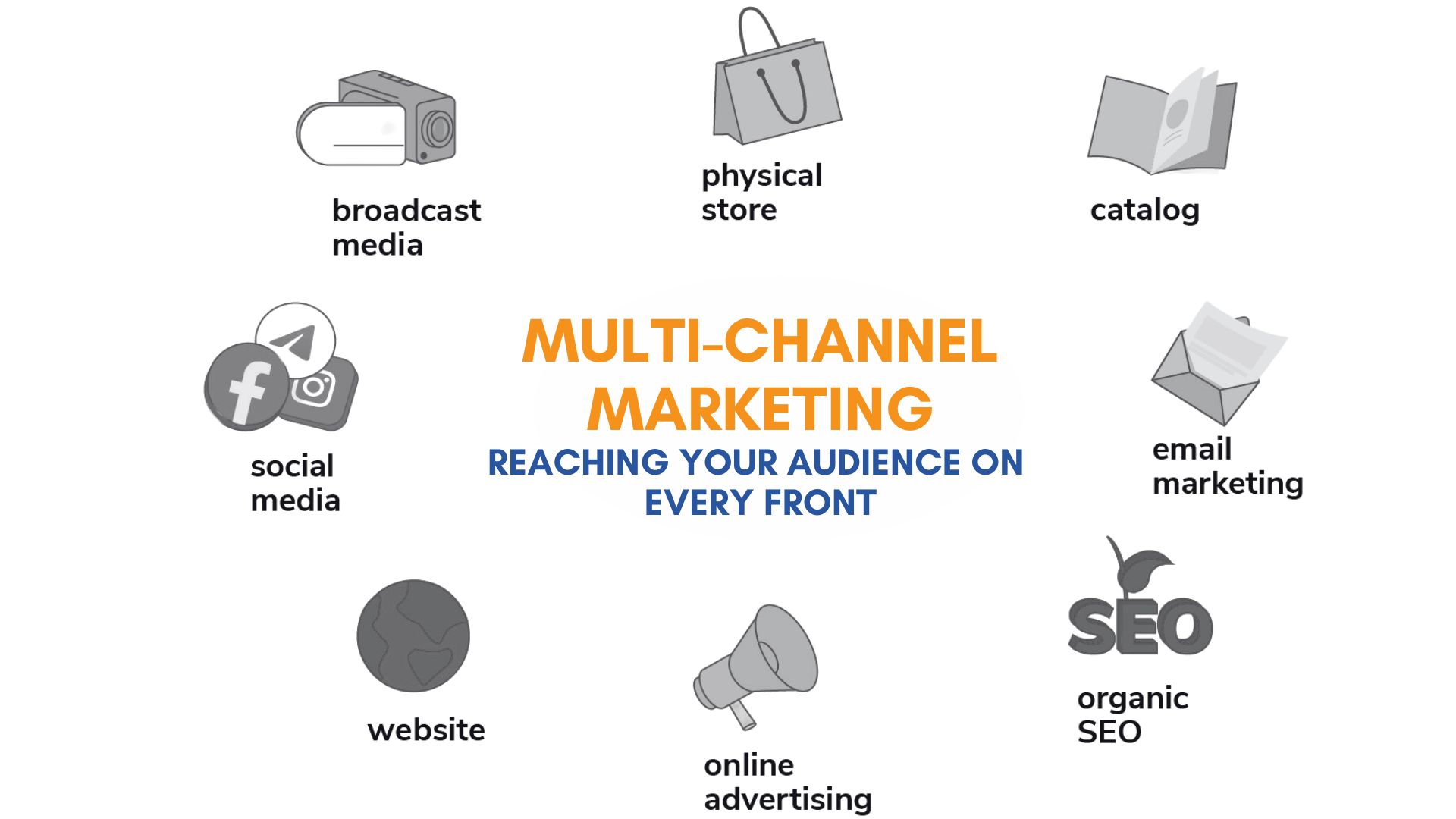Multi-Channel Marketing: Reaching Your Audience on Every Front

Multi-Channel Marketing: Reaching Your Audience on Every Front
In the ever-evolving and interconnected world of marketing, it's essential for companies to constantly adapt and improve to stay ahead of the competition. Gone are the days when a single advertising channel would suffice to engage potential customers. Today, a robust marketing strategy involves leveraging multiple channels to create a seamless and immersive brand experience. This approach, known as Multi-Channel Marketing, has proven to be a game-changer for businesses worldwide.
Understanding Multi-Channel Marketing
Multi-channel marketing refers to the practice of utilising multiple platforms
and channels to interact with customers, promote products or services, and
strengthen brand presence. Our goal is to reach out to our target audience through
different channels, including social media, email, websites, mobile apps, physical
stores, and other points of contact.
The key to successful multi-channel
marketing lies in integration. By creating a cohesive and synchronised experience
across all channels, businesses can reinforce their brand message and establish a
solid and memorable identity in the minds of their customers.
Benefits of Multi-Channel Marketing
1. Increased Reach and Visibility
The most apparent advantage
of multi-channel marketing is the expanded reach it offers. Each channel caters to a
different segment of the audience, allowing businesses to tap into new markets and
demographics. By diversifying their presence, companies can capture the attention of
potential customers who may have remained undiscovered through a single-channel
approach.
2. Enhanced Customer Engagement and Interaction
Multi-channel
marketing provides various touchpoints for customers to interact with a brand.
Whether it's through social media conversations, personalised emails, or interactive
websites, each channel facilitates unique forms of engagement. This accessibility
fosters a deeper connection with customers, making them feel valued and heard.
3. Improved Customer Experience and Personalization
By
gathering data from different channels, businesses gain valuable insights into
customer behaviour and preferences. Using this data can help to create personalised
marketing messages and offers that are customised to suit each individual customer.
Personalisation creates a sense of relevance and care, enhancing customer
satisfaction and loyalty.
4. Increased Sales and Conversions
A well-executed
multi-channel marketing strategy can lead to higher sales and conversions. Research
has shown that customers who interact with a brand through numerous channels have a
higher probability of becoming paying customers. Moreover, the seamless transition
between channels makes it easier for customers to make purchasing
decisions.
5. Better Understanding of Customer
Journey
Multi-channel marketing allows businesses to track the
customer journey more comprehensively. Understanding the path customers take before
making a purchase helps identify pain points and areas for improvement. This
knowledge enables businesses to refine their marketing efforts for optimal results.
Examples and Case Studies
1. Nike: A Champion of Multi-Channel Marketing
Nike, the global sports giant, has excelled in multi-channel marketing by creating a consistent brand experience across all platforms. Their campaigns seamlessly blend digital marketing with in-store experiences. The "Nike Run Club" app engages runners through personalised training plans, while their social media presence promotes inspirational stories of athletes worldwide. This multi-faceted approach has contributed to Nike's brand loyalty and dominance in the athletic footwear and apparel market.
2. Starbucks: Brewing Success with Omni-Channel Strategy
Starbucks is renowned for its omnichannel marketing strategy. Their mobile app allows customers to order ahead, earn rewards, and make payments seamlessly. The app is integrated with its loyalty program, motivating customers to return and redeem rewards. Starbucks also harnesses social media to connect with customers, share user-generated content, and promote seasonal offerings. Starbucks has successfully created a loyal community of coffee lovers by connecting the virtual and physical worlds.
3. Amazon: Personalization at its Finest
Amazon, the e-commerce giant, has mastered the art of personalised multi-channel marketing. Their website and app provide tailored product recommendations based on customer browsing and purchase history. Email campaigns target customers with relevant offers and reminders, while Amazon's advertising platform reaches customers on other websites and apps. By delivering a hyper-personalized experience, Amazon has become a go-to destination for online shoppers worldwide.
4. Sephora: Immersive Beauty Experience
Sephora, the beauty retailer, offers an immersive multi-channel experience to its customers. Their website and app provide product reviews, tutorials, and personalised beauty recommendations. In-store, customers can use augmented reality technology to try on makeup products virtually. Sephora's robust social media presence showcases user-generated content and fosters a sense of community among beauty enthusiasts. This cohesive approach has solidified Sephora's position as a leader in the beauty industry.
5. HubSpot: Education-Driven Marketing
HubSpot, a provider of inbound marketing and sales software, excels in education-driven multi-channel marketing. Through its blog, webinars, and social media, HubSpot offers valuable content to its target audience – marketers and sales professionals. This content marketing strategy nurtures leads and positions HubSpot as a thought leader in the industry. The company's email campaigns further engage prospects with relevant content, leading them through the sales funnel.
Conclusion
In today's digital era, businesses must embrace multi-channel marketing to stay competitive. It is no longer an optional strategy but a necessary one. By embracing diverse channels and integrating them seamlessly, companies can create an enriching brand experience that resonates with their audience. The benefits of multi-channel marketing, including increased reach, improved engagement, and personalised experiences, are evident from the success stories of industry leaders. As customer behaviour continues to evolve, staying adaptable and leveraging the power of multi-channel marketing will remain essential for sustained growth and success.
FAQs
1. What is multi-channel marketing?
Multi-channel marketing is a technique
that involves using various platforms and channels to interact with customers,
advertise products, and strengthen brand visibility.
2. Why is multi-channel marketing important?
Multi-channel marketing expands
the reach of a business, enhances customer engagement, provides personalised
experiences, and increases sales and conversions.
3. How does multi-channel marketing improve customer experience?
By
gathering data from various channels, businesses can personalise marketing messages
and offers, creating a more relevant and enjoyable experience for customers.
4. What are some successful examples of multi-channel marketing?
Nike,
Starbucks, Amazon, Sephora, and HubSpot are excellent examples of companies that
have excelled in multi-channel marketing.

Blog Admin:
Ravinder Bharti
CEO & Founder - Public Media Solution
About: Ravinder Bharti is the Founder and CEO of Public Media Solution,
a leading
marketing, PR, and branding company based in India.